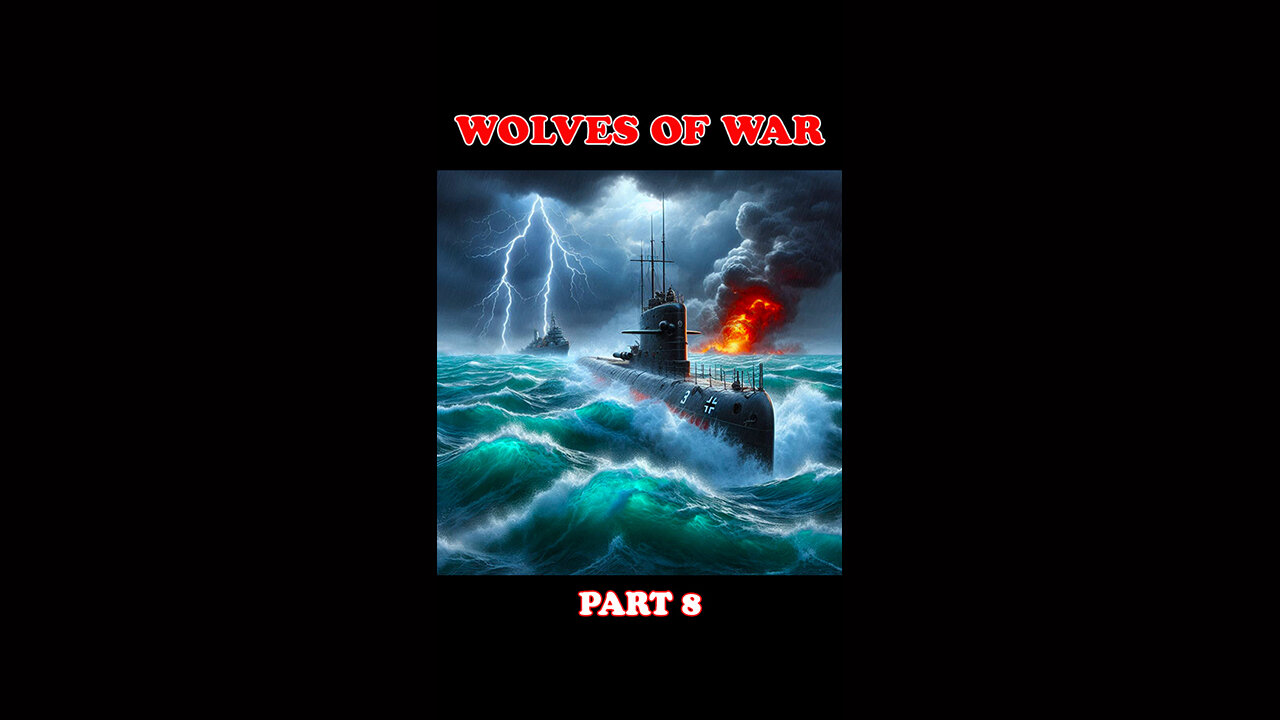Premium Only Content

Inside a Nazi U-Boat - Constant Terror and Insane Conditions! (Part 8)
Confined within a steel tube, Nazi U-boat crews endured relentless claustrophobia, meager rations, foul air, and the constant dread of attack, leading to psychological breakdowns in their desperate fight for survival beneath the unforgiving waves.
Grab a FREE Sahara Desert ebook HERE: https://bit.ly/3PePvYU
CLAUSTROPHOBIA, STALE BREAD, AND UNENDING DREAD - LIFE INSIDE A NAZI U-BOAT
Imagine being crammed into a steel tube, submerged hundreds of feet beneath the ocean’s surface, surrounded by the crushing pressure of the deep and the constant threat of death. This was the reality for the young men who crewed Nazi U-boats during World War II. Their lives were a relentless cycle of claustrophobia, fatigue, and fear, far removed from the romanticized portrayals often depicted in film. This video delves into the harsh realities of living conditions aboard these underwater predators, shedding light on the grueling existence of those who served.
Forget luxurious bunks. Sleeping quarters were a masterclass in efficient space utilization. Sailors often shared bunks, hot-racking – where one man climbed into a still-warm bunk vacated by another. The bunks themselves were narrow and short, barely accommodating the average sailor. Sanitation was minimal, with a shared head (toilet) that often malfunctioned, adding to the already overwhelming stench of sweat, diesel, and unwashed bodies. The lack of privacy and constant proximity to others bred irritability and tension, exacerbating the psychological strain of prolonged confinement.
Food offered little comfort. Fresh provisions were quickly consumed during the initial days of a patrol, replaced by monotonous rations of canned meats, stale bread, and dehydrated vegetables. The bread, often moldy, was a staple, and the constant lack of vitamin C led to scurvy. Drinking water was equally scarce and often tainted, impacting hygiene and morale. The galley was a tiny, cramped space, making meal preparation a logistical nightmare, especially during rough seas when everything threatened to slide off the counters. The limited menu, combined with the motion sickness endemic to submarine life, meant that many sailors suffered from constant nausea and weight loss.
But the true hardship lay in the relentless working conditions. U-boats were incredibly complex machines, demanding constant maintenance and vigilance. Sailors worked in shifts, performing tasks ranging from manning the hydrophones and sonar to maintaining the diesel engines and torpedoes. The air inside the U-boat was thick with exhaust fumes, adding to the already debilitating effects of fatigue. The deafening roar of the engines and the claustrophobic environment further contributed to the psychological toll.
What many people don’t realize is the extent to which these conditions impacted mental health. The constant threat of depth charges, the isolation from the outside world, and the unrelenting stress took a heavy toll. Psychological breakdowns were common, though often hidden due to the stigma attached to mental weakness. The concept of “U-boat mania,” a form of cabin fever characterized by paranoia, irritability, and even hallucinations, was well-documented. Some scholars speculate that this contributed to aggressive decision-making and potentially even war crimes committed by U-boat crews.
Another largely unknown aspect of U-boat life was the prevalence of superstition. Surrounded by the unknown dangers of the deep, sailors often clung to rituals and talismans to ward off bad luck. From specific ways of boarding the boat to carrying lucky charms, these practices offered a semblance of control in a world where they had very little.
Furthermore, the precise procedures for waste management remain a topic of ongoing research. While we know the basics, the details surrounding the methods employed during prolonged underwater missions, particularly concerning the storage and disposal of human waste, are not entirely clear. Archival documents suggest the system was often inadequate, contributing significantly to the unsanitary conditions and the overall sense of confinement.
Finally, the long-term health effects on U-boat crews are still being studied. While many veterans survived the war, the chronic exposure to diesel fumes, lack of sunlight, and psychological trauma likely had lasting consequences. The full extent of these effects, particularly in terms of neurological and respiratory problems, remains an area of active investigation.
Life inside a Nazi U-boat was a brutal and unforgiving experience. Beyond the romanticized narratives, the reality was one of constant hardship, fear, and a desperate struggle for survival. By understanding these realities, we can gain a more complete and nuanced understanding of the human cost of war and the extraordinary resilience of the men who served beneath the waves.
#uboats #war #wwii #wolfpack #warfare #technology #atlantic
-
 1:09:42
1:09:42
Mike Rowe
4 days agoHow Did THIS Dirty Job Make Tommy Mello A Billionaire?! | #447 | The Way I Heard It
14.9K13 -
 LIVE
LIVE
SpartakusLIVE
8 hours agoThe BADDEST Duo in WZ Exhibits PEAK Physique || Duos w/ Sophiesnazz to start, quads later
8,588 watching -
 2:49:37
2:49:37
RattlesnakeTV
19 hours ago $0.10 earnedLIVE DEBATE! Lord Jake vs Crazy Feminist
14.1K10 -
 4:00:42
4:00:42
Badlands Media
11 hours agoThe Narrative Ep. 35: Codex of Truth
82K40 -
 3:55:56
3:55:56
Due Dissidence
14 hours agoSchmuley TRASHES Shapiro, Maxwell Sings For Pardon, Uhuru Doc Preview - Live From St. Louis!
39K40 -
 LIVE
LIVE
Lofi Girl
2 years agolofi hip hop radio 📚 - beats to relax/study to
406 watching -
 2:23:21
2:23:21
PandaSub2000
5 days agoMadison VR (Part 4) | PSVR 2000 (Original Live Version)
18.6K2 -
 2:34:32
2:34:32
Badlands Media
5 days agoCODEX 9/11
295K255 -
 1:53:43
1:53:43
Nerdrotic
8 hours ago $0.30 earnedMysteries of 3I/ATLAS | Forbidden Frontier #113
52.1K5 -
 2:04:21
2:04:21
vivafrei
1 day agoEp. 278: D.C. Peace Wave! Big Tish & Nipple Judge SPANKED! "Maryland Man" Trafficker FREE & MORE?
109K129